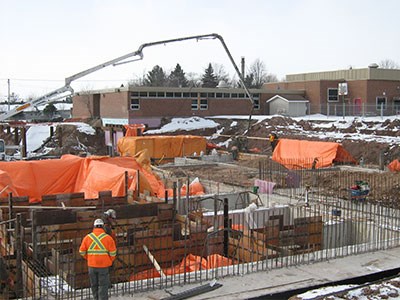With more than 40 years of experience working in health and safety in the construction industry, Bob Ryckman is serious about safety on the job site.
So when Mike Moore tapped Ryckman to make his company, Mike Moore Construction (MMC), one of the safest companies in Northern Ontario, he came out of retirement to make it happen.
“Mike wanted to be the leader in safety—if not among the leaders in the province, then he definitely wanted to be the leader in safety in Northern Ontario,” Ryckman said. “He wanted to be known by reputation as being a safe company, and he has accomplished that.”
The Sault Ste. Marie-based construction firm has earned a Certificate of Recognition (COR) through the Infrastructure Health & Safety Association (IHSA), only the 40th company in Ontario to do so. Launched more than 20 years ago in Alberta, COR is a national standard for health and safety management systems, and is now being used across Canada as a prequalification requirement for many contractors. Achieving COR wasn’t easy. It was time-consuming, costly and required the company to be meticulous in its reporting and auditing.
Ryckman had to ensure the company met the requirements of 19 elements identified by the IHSA. The company was audited first by an internal auditor, followed by an external auditor, and then had to earn a 65 per cent grade in each of the elements and an overall grade of 80 per cent in order to pass.
Two years, 1,000 pages of documents and two three-inch binders later, and Mike Moore Construction was deemed certified under the COR program.
MMC was already operating as a safe company, Ryckman said.
It hasn’t had a lost-time accident in 15 years and is approaching its million hour mark with no injuries of lost time.
But safety guidelines are constantly evolving and becoming more stringent to ensure workers are kept safe.
COR is quickly becoming the standard for contracts with federal, provincial and municipal governments across the country, and may soon become mandatory across the board.
Bob’s daughter, Erin Ryckman, who took over as the company’s safety director when her father retired this past summer, said the crackdown hearkens back to the 2009 case in which four workers with Metron Construction—who were not wearing proper fall protection equipment—plunged to their deaths on Christmas Eve when their swing stage collapsed.
The company later pleaded guilty to criminal negligence causing death under the Criminal Code and was fined more than $300,000.
It was a wakeup call for the industry, which has started holding companies to a higher standard of safety. There’s no room for “wishy-washy rules” anymore, Erin said.
“It has changed the face of occupational health and safety law and what courts are willing to do to prosecute companies for being negligent and sending workers out knowing they’re going to get hurt,” Erin said. “Small businesses are held to the same standard as multi-billion-dollar international corporations.”
In addition to ensuring its workers are doing their jobs in the safest environments possible, having COR certification gives the firm a competitive edge, Bob said. A major accident due to injury means lost production time and skyrocketing costs, as well as a hit to the firm’s reputation. But the certification boosts morale.
“It’s good for hiring people and for retaining good people, because you know that somebody cares about you,” Bob said.
“There are benefits all the way along the line for productivity, attendance, commitment— all of these kinds of things are increased if you have a good health and safety program, because they say we recognize you as an individual and we value you as an individual.”
The company has even taken the process one step further, making health and safety plans a mandatory requirement for its subcontractors. Before a subcontractor can step foot on a job site, it has to prove to MMC it has a health and safety plan in place and that plan has to be signed off by the president before they can go to work.
Though there was some resistance at first, but subcontractors eventually started viewing the procedure as a good thing, because it increases the safety of their own workers and helps cement their own reputations as safe companies.
It’s all part of MMC’s ongoing efforts to retain its spot as the safest construction company in Northern Ontario.
“I’ve worked for other companies, and while I’ve done well and have been supported through the processes, this is a very different company; there’s no resistance,” Erin said. “You bring it forward, you do it in the best way that you can and it’s accepted, usually with, ‘Okay, let’s do it.’”




